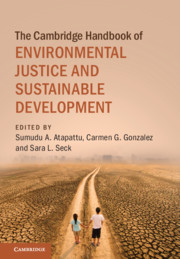Book contents
- The Cambridge Handbook of Environmental Justice and Sustainable Development
- The Cambridge Handbook of Environmental Justice and Sustainable Development
- Copyright page
- Contents
- Contributors
- Acknowledgments
- Foreword (on Living in an Interregnum)
- 1 Intersections of Environmental Justice and Sustainable Development
- Part I Frameworks
- Part II Case Studies
- Strategies, Challenges, and Vulnerable Groups
- 9 The Role of Public Interest Litigation in Realizing Environmental Justice in South Asia
- 10 Children’s Rights or Intergenerational Equity?
- 11 Indigenous Environmental Rights and Sustainable Development
- 12 Indigenous Ancestors
- 13 Water Justice and the Social Pillar of Sustainable Development
- 14 Gender, Indigeneity, and the Search for Environmental Justice in Postcolonial Africa
- 15 Colombo International Financial City
- Toxic Substances and Hazardous Wastes
- Resource Extraction
- Energy
- Climate Change
- Part III Conclusion
- Index
12 - Indigenous Ancestors
Recognizing Legal Personality of Nature as a Reconciliation Strategy for Connective Sustainable Governance
from Strategies, Challenges, and Vulnerable Groups
Published online by Cambridge University Press: 26 March 2021
- The Cambridge Handbook of Environmental Justice and Sustainable Development
- The Cambridge Handbook of Environmental Justice and Sustainable Development
- Copyright page
- Contents
- Contributors
- Acknowledgments
- Foreword (on Living in an Interregnum)
- 1 Intersections of Environmental Justice and Sustainable Development
- Part I Frameworks
- Part II Case Studies
- Strategies, Challenges, and Vulnerable Groups
- 9 The Role of Public Interest Litigation in Realizing Environmental Justice in South Asia
- 10 Children’s Rights or Intergenerational Equity?
- 11 Indigenous Environmental Rights and Sustainable Development
- 12 Indigenous Ancestors
- 13 Water Justice and the Social Pillar of Sustainable Development
- 14 Gender, Indigeneity, and the Search for Environmental Justice in Postcolonial Africa
- 15 Colombo International Financial City
- Toxic Substances and Hazardous Wastes
- Resource Extraction
- Energy
- Climate Change
- Part III Conclusion
- Index
Summary
On the world stage there is now a suite of laws that aspire to recognize Indigenous peoples’ cultural environmental management philosophies and practices. Of international acclaim, on July 27, 2014, Te Urewera, a large forested national park in the North Island of Aotearoa New Zealand, became simply: Te Urewera “a legal entity” with “all the rights, powers, duties, and liabilities of a legal person.”1 Three years later, on March 20, 2017, Aotearoa New Zealand enacted legislation giving legal personality to the country’s third longest river, the Whanganui River.2 In December 2017, it was announced that law will be enacted in the near future to recognize Mount Taranaki as a legal person “effectively giving the mountain the same protections as a citizen.”3 Legal personality of this land, river, and mountain mark a significant positive transformation for Aotearoa New Zealand’s environmental and constitutional laws. These laws provide a connective example of how western colonial law can positively forge a bridge to Indigenous laws. These resolutions are groundbreaking political solutions to constructively accept at a national level Māori Indigenous laws for knowing, caring for, and using lands and waters.
- Type
- Chapter
- Information
- Publisher: Cambridge University PressPrint publication year: 2021
- 3
- Cited by



